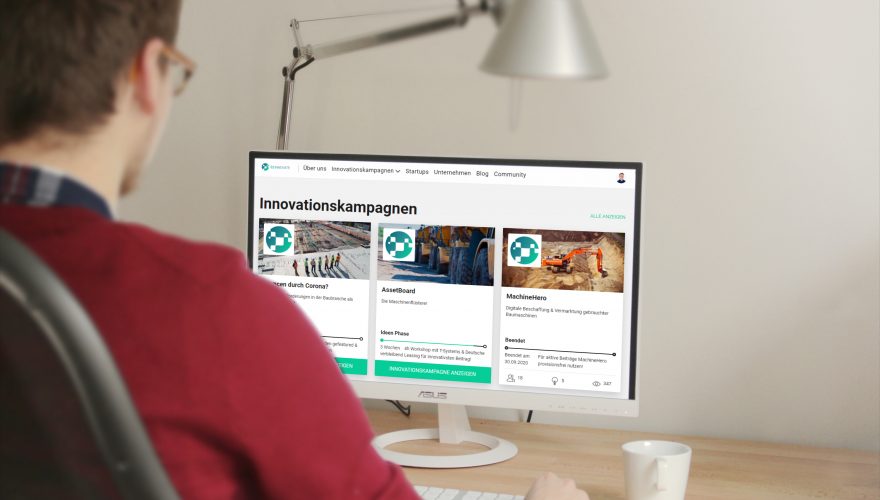Janssen, who?
The company was founded and named after the Belgian chemist, researcher and medical pioneer Dr. Paul Janssen (1926-2003). Since 2011 Janssen launched 17 new products and invested $8.4 billion in pharmaceutical research & development. Janssen focuses on areas of medicine where it can make the biggest difference: Cardiovascular & Metabolism, Immunology, Infectious Diseases & Vaccines, Neuroscience, Oncology, and Pulmonary Hypertension. In Germany Janssen is represented since 1959 and is now one of the five largest research-based pharmaceutical companies in the country.
With approximately 40,000 employees in more than 150 countries around the world, Janssen rises to the challenge each day in pursuit of a healthier future for every person. Its goal is to advance access to good health for all.
Max, what was your challenge? From where did you start?
The German healthcare system is constantly changing. New technologies and innovations are impacting the market at an accelerating pace. For all involved players, including ourselves at Janssen, this can result in a modified role model as well as new opportunities to be active in the market. How, where, when and by whom patients will be treated in the future will probably change fundamentally.
Through co-creation, we wanted to draw visions of the future of the German healthcare system together with the Janssen Co-Creation Community.
Why did you choose crowdsourcing? What were the concrete advantages of the approach?
Already in the last Janssen Co-Creation challenge “GetUp-CheckUp” we developed fantastic ideas for the encouragement of cancer prevention together with the crowd. In the Challenge “Healthcare 2030”, we chose a more open approach. We asked ourselves: “How does the healthcare system in Germany look like in the future?”
We are all part of the system in some way. Be it, hopefully not, as a patient or as a relative of sick family members or friends. Everyone can contribute her or his experience and take part in the ideation and discussion. A big advantage of the approach is the international participation. The structures in Germany have grown historically. Real radical innovations are only possible to a limited extent.
We gathered exciting impulses from ideas that as international success stories could be transferred also to Germany.
How important was the involvement of the students? How did this come about and what did you expect from the involvement?
At Janssen we know that we must work together – across business, academia, governments and society – to lead healthcare’s ongoing reinvention. Key is to collaborate with the world for the health of everyone in it. In 2008, we already launched an idea contest among junior scientists and had very good experiences with it. At that time, the ideas were the starting point for a very extensive study of the future. The study, called “Perspective 2020 – Health as a chance”, was created by Janssen together with experts from the German healthcare system using the Delphi method. Next year we will be in 2020 and it’s worth reviewing what has changed, what not and why things developed the way they did. I am excited to look back on the results of “Healthcare 2030” in 10 years’ time from now.
How many ideas did the contest generate? Did something particularly impress or touch you? Were there any surprises?
A total of 65 idea generators participated in the contest and submitted 86 ideas. Proposals for completely new, disruptive business models and radical innovations were particularly exciting for us. Very impressive was the degree of elaboration every single idea had. In some cases, even complete business models were designed that would work in a fundamentally changed system. For that to happen, the Janssen Co-Creation community focused on understanding the roles and tasks of all players in the healthcare system. Technological solutions have been described in detail. A word mining of all ideas showed that the word “patient” was mentioned the most. That matched, since we at Janssen also place the patient and his interests at the center of all our activities.
What about the winning ideas? What insights did you gain from all the ideas?
HYVE carried out a complex analysis of the challenges that are underlying the ideas. Unsurprisingly, overarching trends in the society could be identified. These can be exemplified by the skilled worker shortage, the undersupply in rural areas, a healthy ageing population and a steadily increasing proportion of chronic illnesses. Eventually the ideas provide solutions so that exactly these challenges can be overcome.
By clustering the results, we identified three central topics that will be incredibly important in the future. These are the networking of all players in the healthcare system via platforms so that relevant data can be exchanged, the storage of this data and, ultimately, its collection by patients through any form of bio-monitoring. Current developments in a digitalized and networked world already indicate a completely digital healthcare system. We want to be actively involved and play our part in shaping this future.
What output did the contest have for Janssen? Why was it the right decision?
The future of healthcare is defined, and we know that the complex landscape presents new challenges, new diseases and new dynamics. We now aim to deliver truly remarkable solutions that provide value to patients, healthcare professionals and the healthcare system. Our pipeline therefore is rich with transformational science reflecting our unique approach to innovation. Now we start our journey to a future, where disease is a thing of the past.
About the interviewee
Maximilian Klaußner joined Janssen Germany in February 2018 and lead the Co-Creation Challenge Healthcare 2030 – Hack the current system, which invited visionaries and creative minds to “hack” the German healthcare system of the future with Janssen.
After completing his bachelor’s degree in general business administration at Heinrich-Heine University in Düsseldorf, he studied health economics with Prof. Dr. Jürgen Wasem in Essen. At Janssen Germany, he works in the field of New Business Development & Innovation Management, collaborating with external partners and evaluating business development potential.


